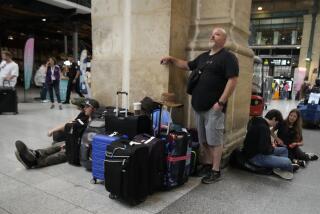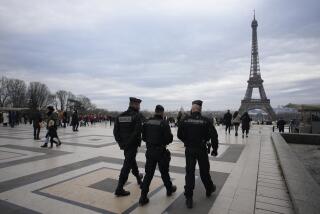Madrid Bombing Suspect May Have Been on Train
- Share via
MADRID — Spanish police are investigating a witness account that a Moroccan suspect with alleged links to Al Qaeda was aboard one of the trains bombed here last week, a high-ranking law enforcement official said Monday.
Although investigators remain cautious of the witness’ account because the identification was based on a photograph, the reported sighting adds to suspicions that Jamal Zougam, one of three Moroccan suspects under arrest, played a key role in the bombings, the official said. Zougam’s suspected ties to Al Qaeda first surfaced here in 2001, but Spain’s interior minister revealed Monday that Zougam and the other Moroccans were not under surveillance before last week’s bombings.
For the record:
12:00 a.m. March 18, 2004 For The Record
Los Angeles Times Thursday March 18, 2004 Home Edition Main News Part A Page 2 National Desk 1 inches; 36 words Type of Material: Correction
Train bombing -- A photo caption Tuesday in Section A incorrectly described a scene at a railway station as occurring during “three minutes of silence in Madrid.” The photo was taken at Waterloo Station in London.
In the wake of the attacks that upended Sunday’s national elections here and ousted the ruling party that strongly supported the war in Iraq, Europe’s security forces are worried about repercussions beyond the toll of 200 dead and 1,500 wounded.
If terrorist groups conclude that the Madrid bombers succeeded in bringing down a government, investigators said, the menace of new attacks will grow.
“It’s diabolical because it gives the movements connected to Al Qaeda the conviction that they have the capacity to change a government,” said a European police commander with long experience investigating Islamic networks.
“That they can get rid of a government perceived as tough on terrorism. They will see this as a total political success.”
Troubled by this extraordinary convergence of violence and politics in Madrid, European security forces have gone on heightened alert. The bombings could encourage emulators, they said. The U.S. allies with troops in Iraq -- especially Britain, Spain and Italy -- are prime targets of Islamic extremist networks, investigators said.
“There’s lots of concern,” a senior Italian investigator said. Referring to new intelligence about plots in the making, he added: “It’s especially difficult because we have to examine the information coming in and select what we think is credible.”
Spanish investigators have not yet confirmed that extremists connected to Al Qaeda were behind the bombings. Interior Minister Angel Acebes and other officials cautioned Monday that the possible involvement of Basque terrorists has not been ruled out.
Opponents of outgoing Prime Minister Jose Maria Aznar say his handling of the crisis caused the electoral collapse of his Popular Party, which led handily in opinion surveys before the bombs went off on commuter trains Thursday.
The government’s rush to blame the Basque insurgent group ETA, rather than Islamic extremists, triggered a backlash. Voters blamed the attacks on Aznar’s support for the war in Iraq and accused the government of hiding the truth. They elected the underdog Socialists.
The danger lies in how terrorists will read the voters’ reaction. Some analysts expressed consternation Monday that protesters over the weekend chanted slogans accusing Aznar’s government, rather than the bombers, of murder. Some commentators warned that voters played into the hands of terrorists, setting a grim precedent.
“What won yesterday was the pitiful option of surrendering to an adversary ... a thousand times worse than Nazism,” wrote columnist Gabriel Albiac in El Mundo newspaper. “This is what was elected yesterday: renouncing the fight; accepting death. Al Qaeda won.”
Even some European counter-terrorism officials who disagree with U.S. policy in Iraq were surprised that the Madrid attacks directed the public’s wrath toward the Aznar government, which had aggressive anti-terrorist policies, rather than at the bombers.
“I’m not a sympathizer of Bush, but we can’t make a mistake about who the enemy is,” the European police commander said. “Bush is not the same as [Osama] bin Laden. Strategically, these attacks were designed to punish a government that was seen as hard on terrorism. The goal is to fragment, to destabilize. To divide Europe from the United States, to divide Europeans from Arab immigrants.”
Investigators said Monday that the plotters of the Madrid bombings realized that Aznar’s party retained solid support but had made itself vulnerable with an insistent pro-U.S. stance on Iraq that defied widespread opposition.
“Whoever did the attacks has to have a profound understanding of Spanish sentiment,” a veteran Spanish counter-terrorism investigator said Monday. “This was someone who knew the Spanish mentality.”
Zougam and the other two suspects fit that description. They are longtime legal immigrants who owned businesses; a number of their associates arrested in recent years have Spanish citizenship and Spanish wives.
Despite a police search of Zougam’s home in 2001 that turned up evidence of ties to Islamic terror networks across Europe and the Middle East, the lengthy investigation of Al Qaeda activity did not result in charges against him. That is why Zougam and the other suspects -- two Moroccans and two Indians -- were not under surveillance before last week’s bombings, Acebes, the interior minister, said Monday.
Surveillance here requires an order from an investigative magistrate. There was no order regarding the bombing suspects, Acebes said.
The revelation is surprising because Spanish counter-terrorism units have kept close watch on Islamic extremist networks, especially after the Sept. 11 attacks. And Zougam seems a prime candidate for surveillance because of his wide contacts with the alleged leader of a Madrid Al Qaeda cell and other suspects who are now fugitives or behind bars.
Spanish law enforcement did not detect an increase in suspicious activity or in “chatter” among Islamic extremists suggesting a plot in the offing, according to the veteran counter-terrorism investigator. On the other hand, police had girded for an election-eve attack by the violent Basque separatist group ETA after disrupting a series of major bombing plots in recent months.
Zougam remained Monday in the custody of police, who have until Thursday to turn him over to prosecutors for a decision on charges. So far, the suspects are being held in connection with the cellphones and calling cards used as detonators for the remote-controlled backpack bombs.
But the emergence of a survivor of the bombings who places Zougam on one of the targeted trains reinforces suspicions that he may have actually been one of those who planted the bombs.
Police believe that the attackers distributed 13 backpack bombs -- 10 of which went off -- on four trains and got off before the explosions. There is no sign that any suicide attacks were involved, Acebes said Monday.
Based on a photograph, the uninjured witness identified Zougam as a fellow passenger, the high-ranking law enforcement official said.
“The witness identifies him, but remember that identifications based on photographs can be problematic,” the official said. “We have to keep investigating to confirm this.”
More to Read
Sign up for Essential California
The most important California stories and recommendations in your inbox every morning.
You may occasionally receive promotional content from the Los Angeles Times.













